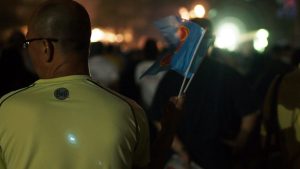Desiring political opposition beyond COVID-19 pandemic in Singapore
February 14, 2023

Since 2020, countries all over the world have struggled to contain the COVID-19 pandemic. As to be expected, “successful” containment of the spread of the viral infection should generate electoral support for the incumbent government, as in the case of South Korea in April 2020. However, the relative success in infection containment within Singapore resulted in the opposite electoral effort, with the long-governing People’s Action Party (PAP) receiving the second-lowest popular votes in its uninterrupted history in government.
In ‘Desiring political opposition beyond COVID-19 pandemic in Singapore’ (Inter-Asia Cultural Studies, 2020), Professor Chua Beng Huat (Yale-NUS and NUS Sociology and Anthropology) and Ms Meisen Wong (Technische Universität (Darmstadt)) explain the reasons for this unexpected outcome.
On 14 February 2020, a Harvard University study hailed Singapore as the “gold standard” of pandemic containment. The government began to talk about the need for a “fresh” and “strong” mandate to deal with the anticipated problems generated by this “crisis of the generation.” The general election, which was not due until April 2021, was thus brought forward to June 2020. Riding on its track record of almost six decades of sustained economic growth that had delivered much to Singaporeans, and the assumption of a “flight to safety” response where people would seek firm leadership during crisis, PAP believed that the electoral ground was to its advantage.
According to Prof Chua and Ms Wong, a significant contribution to the disappointing election result for the PAP was the “strong” mandate they sought. With its already insurmountable dominance in parliament and popular electoral support in all the past elections, a “stronger” mandate in parliament for the next five years could only mean a parliament without any elected opposition party members. The total dominance by the PAP in parliament without a single opposition MP was a real possibility, as it had happened from 1968 to 1981. This plausible scenario was what the various opposition parties campaigned against, with the slogan of “No blank cheque for the PAP.” The result reflected the long-simmering desire among Singaporeans for oppositional representation and diversity in the parliament could no longer be denied.
Furthermore, the media exposure of the horrendous living conditions in the migrant workers’ dormitories had caused outrage among Singaporeans, who demanded immediate improvements. The imposition of the national lockdown (circuit breaker) also caused a blow to the public’s trust in the government.
During lockdown, all schooling shifted to full home-based learning (HBL). Employers were mandated to implement work-from-home (WFH) for their workers whenever possible. Apart from the medical professionals who were “frontline” workers in direct contact with the infected, almost all other “essential” workers were low-skilled, low-waged service providers, many of whom were senior citizens. While free to move to carry out their services, they risked infection. All other employment was by definition “non-essential,” covering overwhelmingly white-collar workers, who could work from the safety of home. The differentiated risk under WFH starkly exposed class inequalities.
The authors add that HBL also exposed the presence of poverty. Children from low-income families generally do not have access to Wi-Fi connections and computers in the highly wired Singapore. For those in small rental flats, “home” was an unconducive study environment, and lower-educated parents were unable to assist with their children’s learning.
Read the article here.
